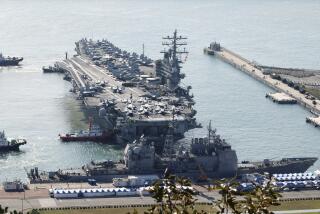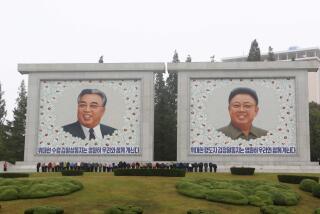U.S. Warns Japan on Trade Practices
Privately and publicly, President Clinton warned Japanese Prime Minister Keizo Obuchi on Friday about unfair trade practices, stressing that the burgeoning trade imbalance between the United States and Japan could force the U.S. into a protectionist mode that would have grave consequences for the global economy.
On the second day of the president’s visit to Japan, Clinton and Obuchi also agreed to work together closely in trying to stop North Korea from developing nuclear weapons or the missiles to deliver them.
North Korea test-fired a newly developed missile called the Taepo Dong-1 over Japan and into the Pacific Ocean in August, and U.S. intelligence has found what is called a “suspect” new site. Such a facility could indicate that North Korea is planning to maintain its nuclear program, which it had agreed to freeze under a landmark 1994 accord with Washington.
In Seoul today, Clinton exhorted North Korea to abide by its agreements on nuclear nonproliferation, warning that “further provocations will threaten the progress we have made.”
Appearing at a news conference with South Korean President Kim Dae Jung, Clinton said that North Korea’s recent test-firing of a missile and its work on an underground site suspected of being used to secretly revive an outlawed nuclear weapons program are “cause for deep concern.”
Kim said that in his talks with Clinton, the two leaders agreed mutually that they will “not tolerate any possible attempt by North Korea to proliferate nuclear weapons, missiles and other weapons of mass destruction.”
On Friday in Tokyo, the president’s central message was economic, stressing that it would be good for economically ailing Japan and the rest of the world if Tokyo does more to spur growth and allow freer trade with the United States and the rest of Asia--and dangerous if it does not.
“Protectionism is a no-growth strategy that offers no way out of the current economic crisis,” Clinton said as he stood beside Obuchi. “If coupled with actions which lead to an artificial explosion of exports in other countries, in fact, it can promote a protectionist reaction there, further slowing growth.”
In private meetings with Obuchi, Clinton raised concerns about trade practices by Japan that had resulted in a 500% increase in Japanese exports of hot-rolled steel to the United States.
Earlier in the day, Clinton told Japanese and U.S. business executives that he was worried about possible retrenchment by the United States if unfair trading practices by Japan continue.
He suggested that Japan is not doing its share to help Asia’s weaker economies recover.
“This year, the Asian ailing economies’ exports to Japan are down by $13 billion,” Clinton told the executives. “In America, they’re up by $5 billion.”
The president’s tone on trade was different during his two previous visits to Japan, in 1993 and 1996, because conditions in the global economy have changed. During his visit two years ago, Japan’s economy--along with many other Asian economies--was still strong.
Clinton sweetened his comments by praising the steps that Obuchi has taken to reform his country’s banking system and stimulate economic growth with tax cuts and public investment.
“I think it is unfair to have a negative judgment of the government’s efforts based on the fact that no one feels any results now,” Clinton said. “After all, Prime Minister Obuchi has not been in office very long.”
Obuchi became prime minister in July.
U.S. officials said the Japanese premier did not make any specific pledges in his conversations with the president Friday afternoon. However, the officials stressed that they believe Obuchi understands his nation’s responsibility as the powerhouse of Asia.
“The No. 1 economic power, the United States, and the No. 2 economic power, Japan, must take initiatives in order to ensure the prosperity and stability in Asia,” Obuchi said during joint public statements after their meetings.
Answering a reporter’s question on North Korea, Obuchi said the missile that Pyongyang test-fired over Japan “was a very shocking experience for us.”
Since then, there have been reports that North Korea might be preparing to fire a second missile.
Clinton administration officials acknowledged earlier this fall that they had sent out private warnings to North Korea not to conduct any more missile test-firings.
The Washington Post reported this week that North Korea has built launch sites to fire additional missiles. Clinton administration officials refused to confirm this report, but the president told reporters that “there are some disturbing signs there.”
Times wire services contributed to this report.
More to Read
Start your day right
Sign up for Essential California for news, features and recommendations from the L.A. Times and beyond in your inbox six days a week.
You may occasionally receive promotional content from the Los Angeles Times.






